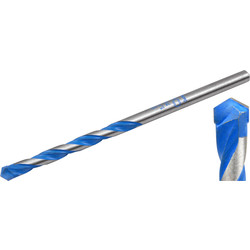Well done for doubling up wall plugs - good to spread the load. The screw-gripping part of a plug is very short.
Enormous holes that loo roll thing has, and exposed screws? Maybe mirror screw caps would be good - the disc or dome things you can get.
Quite a lot of agreement in the thread I see, but there is just SO MUCH to fixing things on the wall with all the variables, I think just I could write several pages.
If the damned hole in the wall isn't where you want it, skinny wedges can save the day. Clothes pegs are a good start. Get one with straight grain and split it lengthwise. (or even a match stick or three)
With the distance you have between the object and the grip which is in the brick, you can afford to do the screws up "quite tight" then force the TR holder straight, then screw them properly tight. It'll be fine until granny uses the thing for a support while she gets up.
I get the argument about good tools but I think the DIY drill product is mature enough that an ordinary thing will be fine as long as you use it gently and with the right bits. If you try to make a 10mm hole it'll just dance about and wreck the PB, but taking it slow in stages you'll be absolutely fine.
One type of drill bit which will make life easier is the "drill anything" type of multi - purpose carbide tipped one. They are SHARP!.
Toolstation have a better range than Screwfix (as is usually the case). They have a Milwaukee set which looks good for the range of sizes and the BOX. The box is enormously important - the Bosch type soons fails. Milwaukee have a strange respect in the UK. In the USA they're nothing special. Nice box, though.
If 30 quid is too much for a set of bits - understandable - then you only neeeeed one - this one:
A multipurpose drill bit from the Bosch EXPERT range that excels with almost any material used in interior fitting work. Soft concrete, masonry, brick, cement asbestos, ceramics and tiles, softwood, plastic, sheet metals, aluminium – none of them are a problem for this impressive bit.Designed...

www.toolstation.com
It's 4mm, which will start you precisely, where you want, in anything, with a diy drill and often without a hammer. It'll be a revelation.
Who cares if the job takes you a minute longer?
Cheap masonry bits are a pain.


